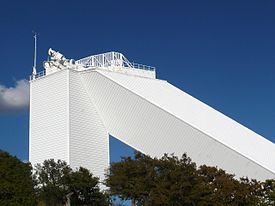McMath-Pierce Solar Telescope
 |
|
| Alternative names | McMath–Pierce Telescope |
|---|---|
| Location(s) | Kitt Peak National Observatory |
| Coordinates | 31°57′30″N 111°35′42″W / 31.95833°N 111.59500°WCoordinates: 31°57′30″N 111°35′42″W / 31.95833°N 111.59500°W |
| Organisation | National Solar Observatory |
| Altitude | 2,096 m (6,877 ft) |
| Wavelength | Visible and infrared |
| Built | 1960–1962 |
| Telescope style | Unobstructed-aperture Off Axis Prime focus reflecting telescope |
| Diameter | 161 cm |
| Secondary diameter | 2.03 m (primary heliostat) |
| Tertiary diameter | 1.52 m |
| Angular resolution | 0.07 arcsec @ 500nm (theoretical) |
| Collecting area | 2.04 m² |
| Focal length | 87 m |
| Mounting | Equatorial mount with heliostat |
| Enclosure | Slanted tower |
| Website | [1] |
|
|
|
|
[]
|
|
McMath–Pierce solar telescope is a 1.6 m f/54 reflecting solar telescope at Kitt Peak National Observatory in Arizona, United States. The building was designed by Myron Goldsmith and built in 1962. Until the completion of the Daniel K. Inouye Solar Telescope it was the largest solar telescope, and the largest unobstructed aperture telescope in the world. It is named for astronomers Robert McMath and Keith Pierce. At the dedication in 1962, Dr. Waterman read a letter from President Kennedy starting with:
The telescope is a triple instrument. In addition to the primary 1.61 m mirror fed by the 2.03 m heliostat, there are a pair of telescopes fed by 0.81 m heliostats mounted beside the main heliostat. These two instruments have 1.07 m and 0.91 m primary mirrors.
The telescope uses the heliostat at the top of its main tower to direct the sun's light down a long shaft to the primary mirrors. The distinctive diagonal shaft continues underground, where the telescope's primary mirror is located. The theoretical resolution of the main telescope is 0.07 arcsec, although this is never reached because atmospheric distortions degrade the image quality severely. The image scale is 2.50 arcsec/mm at the image plane.
The secondary telescopes are called East and West. They are completely independent of the main telescope. These two auxiliary telescopes each have a 0.91-meter heliostat located beside the main heliostat. These auxiliary telescopes have a slightly shorter focal length and f-numbers of 50 and 44. The resolution of the auxiliary telescopes is 5.11 arcsec/mm and 5.75 arcsec/mm.
The enclosure of the telescope was designed and engineered by the Chicago office of Skidmore, Owings and Merrill.
The third mirror of the main telescope which sends the light down into the observing room can be moved above three different positions. Two of these have a vacuum spectrograph beneath them, one of 18 meter deep and the other 4 meter deep with lower resolution but higher light throughput. These two spectrographs are able to rotate to compensate for the rotation of the image caused by the use of a heliostat. The third position can only be equipped with a static optical table with no image rotation correction and is therefore rarely used.
...
Wikipedia
